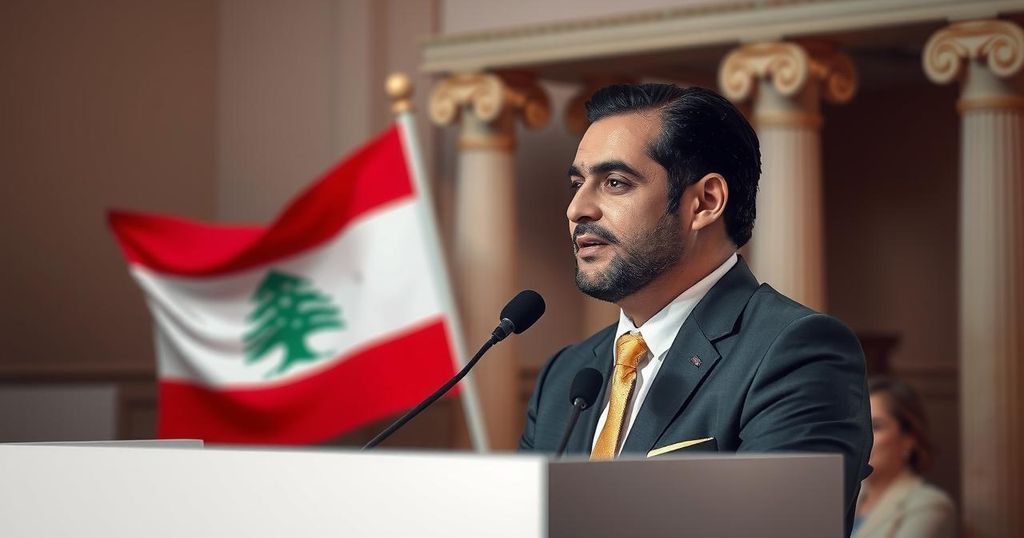Lebanon Elects New President Amid Saudi Diplomatic Initiative
Lebanon elected Army Chief Joseph Aoun as president, aided by Saudi Arabia’s diplomatic intervention. His election ended a two-year political deadlock and raises questions regarding the future of Hezbollah amid promises of disarmament. Aoun must navigate internal complexities while balancing regional influences as he aims to restore stability and governance in Lebanon.
On Thursday, Lebanon witnessed a crucial turning point with the election of Army Chief Joseph Aoun as president, largely influenced by a Saudi diplomatic initiative. As tensions had escalated within Lebanon’s fragmented political environment, the country faced a looming crisis of leadership. The Saudi delegation’s rapid and strategic engagement with various political factions culminated in Aoun receiving 99 votes in Parliament, enabling him to surpass the two-thirds majority required for election. His victory heralded a potential disarmament of Hezbollah, despite the group’s ambiguous acceptance of the new leadership.
Following more than two years devoid of a president, Lebanon’s political landscape had been riddled with indecision and factional strife. Significant external pressure from Saudi Arabia, alongside Western diplomatic efforts, played a pivotal role in consolidating support for Joseph Aoun. His election raises important questions regarding the future balance of power within Lebanon, especially considering Hezbollah’s past dominance under prior Iranian-backed leadership.
Hezbollah’s seemingly acquiescent vote for Aoun suggests a strategic recalibration in light of recent military setbacks and regional developments that have impacted the group’s operational capabilities. Aoun’s promise to disarm various militant factions, including Hezbollah, may not only reflect a shift in internal governance but also signal a broader withdrawal of external influences previously favored by the group. Furthermore, regional dynamics involving Iran and Saudi Arabia will likely influence Lebanon’s political equilibrium moving forward.
As President Aoun prepares to govern, he will need to navigate the complexities of Lebanese society, striving to uphold sovereignty while addressing external pressures. Analysts express cautious optimism regarding Aoun’s potential to enact positive changes and foster national unity. The interplay of internal and international relations will undeniably shape the trajectory of Lebanese governance in the forthcoming era, as Aoun aims to deliver on his vision for revitalizing the state amid lingering challenges.
The recent election of Joseph Aoun as Lebanon’s president culminated in a significant shift in the nation’s political dynamics, marking a departure from prior Iranian influence. The election process highlighted a fractured political elite struggling to reach consensus, prompting Saudi Arabia’s strategic intervention. By circumventing the stalemate and facilitating Aoun’s presidency, Saudi Arabia reasserted influence in Lebanon, which had traditionally been viewed as within Iran’s sphere. This event not only illuminates the complexities of Lebanese politics but also underscores the delicate balance of power among various regional players.
The election of Joseph Aoun as Lebanon’s new president illustrates a significant political transformation influenced by external forces, primarily Saudi Arabia’s re-engagement. This pivotal moment raises questions about the future of Hezbollah and its military capabilities as Aoun seeks to promote national disarmament and governance. As Lebanon stands at this crossroads, the potential for both internal stability and international collaboration emerges; however, the path forward remains fraught with challenges that necessitate careful navigation by the new leadership.
Original Source: www.cnn.com




Post Comment